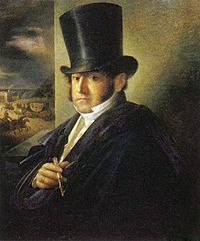Konstantin Bulgakov facts for kids
Quick facts for kids
Konstantin Yakovlevich Bulgakov
|
|
|---|---|
| Константин Яковлевич Булгаков | |
 |
|
| Born | December 31, 1782 Constantinople
|
| Died | October 29, 1835 (aged 52) Saint Petersburg
|
| Cause of death | stroke |
| Resting place | Saint Petersburg |
| Nationality | Russian Empire |
| Citizenship | Russian Empire |
| Education | secondary |
| Alma mater | Saint Peter's School |
| Occupation | diplomat, postal administrator, privy councillor |
| Years active | 1797–1835 |
| Known for | correspondence, writing |
| Home town | Saint Petersburg |
| Title | Director of the St. Petersburg Post Office and Russian Postal Department |
| Term | 1819–1835 |
| Successor | Feodor Pryanishnikov |
| Spouse(s) |
Maria Varlam
(m. 1814–1835) |
| Children | 5 including: son Alexander Bulgakov (1816–1873) daughter Sofia Perovsky (1818–1902) daughter Maria Bulgakov (1823–1848) |
| Parent(s) | Yakov Bulgakov (1743–1809) Catherine Amber (?–1809) |
| Relatives | brother Alexander Bulgakov (1781–1863) |
| Awards |
|
Konstantin Yakovlevich Bulgakov (1782–1835) was an important Russian official. He worked as a diplomat and managed the postal service. He was also a "privy councillor," meaning he advised the emperor.
Konstantin Bulgakov became the Director of the Moscow Post Office. Later, in 1819, he moved to Saint Petersburg. There, he became the Director of the Saint Petersburg Post Office. Eventually, he led the entire Postal Department of the Russian Empire. He and his brother, Alexander Bulgakov, who ran the Moscow Post Office, could send letters to each other easily. This was because they were both in charge of the Russian postal system.
Early Life and Career
Konstantin Bulgakov was born in 1782 in Constantinople. His father, Yakov Bulgakov, was also a diplomat. Konstantin started working for the government in 1797. He was very good at languages. This skill helped him serve as a diplomat during Russia's wars with Turkey and France.
In 1815, Konstantin helped the Russian Tsar Alexander I. This was at an important meeting called the Congress of Vienna. The Tsar offered him a job as an ambassador in Copenhagen. But Konstantin asked for a different role. He wanted to be the Director of Posts in Moscow.
He got the job in February 1816. He did very well there. In December 1819, he moved to Saint Petersburg. There, he worked with Prince Golitsyn, who was in charge of the whole Russian Postal Department.
In 1831, Bulgakov was promoted. He became the Director of the Postal Department. He also received an award. Sadly, he had two strokes in 1835. This was likely due to working too hard. He passed away that same year.
Improving the Postal Service
Konstantin Bulgakov made many important innovations. One big change was starting passenger-carrying mail-coaches. These coaches traveled between major Russian cities and the Baltic areas. These services began in 1821. They continued until 1868, when railways took over.
In 1825, the first official survey of post-roads in Russia was published. Building paved roads had started in 1817. By the 1850s, Russia had over 1,500 miles of paved roads. This progress allowed Bulgakov to create "express posts." These were faster mail services between big cities.
Bulgakov also signed a postal treaty with Prussia. In 1832, he started a steamship service. This service ran between Saint Petersburg and Lübeck.
All these improvements made mail delivery much faster. For example, a letter from Berlin to Saint Petersburg used to take nine days. After Bulgakov's changes, it took only five days. The Dowager Empress Maria Feodorovna praised the better service. She was the widow of Paul I.
Bulgakov also cared about the people who worked for the postal service. He worked hard to make their working conditions better.
Related pages
 | Aurelia Browder |
 | Nannie Helen Burroughs |
 | Michelle Alexander |

